The renewable energy industry woke to a shock this morning with a front-page Australian Financial Review headline that the conservative Abbott government was planning to abolish the renewable energy target.
AFR journalist Phil Coorey reported that prime minister Abbott had asked the climate skeptic and business leader heading the review of the target, Dick Warburton "to do more work on the option of terminating the target altogether."
Before the election, Tony Abbott and then-opposition environment spokesman (and now minister) Greg Hunt promised not to abolish the renewable energy target. On 19 June 2013, Hunt said on Sky News:
We agree on the national targets to reduce our emissions by five per cent by 2020. We also agree on the renewable energy target. And one of the things we don't want to do is to become a party where there is this wild sovereign risk where you are, where businesses take steps to their detriment on the basis of a pledge and a policy of Government. And we're very clear that that's not what we want to be.
When pressed by reporters whether an Abbott government would abolish or reduce the renewable energy target, Hunt said:
We support the RET, the 20 per cent. We'll have a mandated review in 2014. People have right to express views, but our position clear. We'll get rid of carbon tax, keep RET and take pressure off electricity prices and improve competitiveness.
It was not just Hunt who made this commitment. From a doorstop interview on 29 September 2011:
QUESTION: Is the Coalition committed to a renewable energy target?
TONY ABBOTT: Look, we originated a renewable energy target. That was one of the policies of the Howard Government and yes we remain committed to a renewable energy target. I certainly accept that the renewable energy target is one of the factors of the current power system which is causing prices to go up but we have no plans to change the renewable energy target.
QUESTION: Will you then pull your Nationals colleagues into line and tell them to support it?
TONY ABBOTT: Well, the Coalition, we have a position, we support renewable energy targets. Now, that's not to say that there can't be debate on this subject, nothing wrong with debate, nothing wrong with people having an opinion. I'm in favour of free speech, I'm in favour of my colleagues having opinions but our position is to support the renewable energy targets.
The appointment of Dick Warburton was a clear statement from Abbott that he had no real intention of honouring this promise.
Warburton has a pedigree for making factually incorrect statements about carbon pricing, renewable energy, wind turbines, and global warming. He was hand-picked by Abbott to head up the review into the renewable energy target in February this year, a move that gravely concerned many in the renewable energy industry.
There was never any strong possibility under a Warburton review of the renewable energy target of an outcome other than a repeal recommendation. Warburton does not accept the evidence that burning fossil fuels causes global warming.
Both Warburton and Abbott are entirely captured by the fossil fuel industry. A report from Fairfax's Lisa Cox earlier in August showed that Warburton's review relied in "very large part" on a forecast by the Australian Energy Market Operator that found "that there will be more electricity generation than required until 2024." He has also cited research by the pro-fossil fuel industry group the Australian Chamber of Commerce and Industry, which repeated the lie that the renewable energy target would cost jobs and harm the economy.
Warburton's conclusion is not that there is a glut of fossil fuel energy on the martket, but rather that renewable energy is at fault. He and Abbott have also repeated the lie that renewable energy increases electricity prices. Renewable energy actually decreases electricity prices.
This falsehood is spread by fossil fuel generators who are finding their monopoly position under pressure from a combination of reduced demand and low-cost renewables. Generators like Origin, AGL and foreign-owned Energy Australia have mounted a fierce anti-renewable energy target lobbying campaign since the election of the Abbott government.
AGL for example has called for the complete elimination of the rooftop solar component of the renewable energy target while making massive investments in coal seam gas projects and the brown-coal power plant Loy Yang in Victoria. Origin meanwhile wants to halve the renewable energy target, and many in the energy industry suspect Origin of blocking renewable energy projects through non-issuance of power purchase agreements. Finally, Energy Australia, wants the target scaled back and the solar component capped and phased out.
It's not hard to understand why these power companies want to scrap the target. A review by the Jacobs Group for The Climate Institute, Australian Conservation Foundation and WWF showed that abolishing the target would see a profit windfall of $10 billion over 15 years for the owners of coal and gas-fired power plants. These profits would come from increased electricity costs for consumers.
In fact, Australia has been well-served by the modest renewable energy target. The target mandates that 20 percent of our electricity must come from renewable sources like solar, wind and hydro by the year 2020.
Since being implemented under the Howard government and supported under the Rudd/Gillard government, it has attracted around $18 billion of investment and is expected to see another $18 billion by 2020. Thousands of jobs have been created as a result of the target, and it is responsible for a substantial amount of the reduction in carbon pollution in the last few years.
The Clean Energy Council released a strongly worded statement on Monday expressing concern over fears that the renewable energy target could be scrapped. Acting chief executive Kane Thornton said that cutting the target would "devastate" the renewables industry and that "such a move would be reckless" and "out of touch with the vast majority of Australians who want more renewable energy, as demonstrated by the fact that 99 per cent of the 24,000 submissions to the review of the policy called for it to be maintained or increased –- and the fact that over 4 million Australians already live or work under a solar power system."
Over 21,000 people are employed in the renewable energy sector.
The Abbott government in less than 12 months has shown itself to be a serial breaker of promises. Many of the promises they have broken appear to have been made under false pretences – that is, Abbott and his ministers likely knew they would break them before the election in 2013.
The prompt appointment of Dick Warburton to review the renewable energy target, despite the promise of keeping the 20 percent target, is an example of a promise made under false pretences. Abbott would have had no doubt of Warburton's findings, and likely appointed him to create a justification for reducing or abolishing the target.
71 percent of Australians support the renewable energy target as it is or want it strengthened. Abolishing the renewable energy target has no public support, which was why Abbott had to promise to keep it before the 2013 election.
All these broken promises and breaches of faith with the Australian public means the Abbott government is extraordinarily weak. Finance Minister Mathias Cormann was dispatched to play defence, denying that the Abbott government planned to abolish the target, albeit with weasel words.
ON ABC radio on Monday, Senator Cormann would not confirm that such a plan was afoot, but he said the government intended to keep the target in place.
"Our position is to keep the renewable energy target in place," he said.
"The government remains committed to the renewable energy target, that is our policy.
"We are currently waiting for the results of a review which is on the way and obviously we'll make decisions once that review is received in an orderly and methodical fashion."
The weakness of the Abbott government can be plainly seen by the inability for treasurer Joe Hockey to get the federal budget passed by the senate, by Abbott's abandonment of domestic politics for jingoistic adventures overseas and bizarre interventions into the Scottish independence referendum, the announcement of draconian terrorist surveillance laws, and the dumping of the Andrew Bolt racial vilification amendments.
The 20 percent target is a very modest target. Australia is one of the world's largest percapita polluters (although is no longer the worst, due to the effects of the carbon price and renewable energy target), largely due to the burning of coal for energy.
If Australia is serious about reducing the impacts of global warming, then the renewable energy target should be increased.
This would reduce substantially carbon pollution. It would also, according to modelling by the University of NSW reduce risks associated with wholesale electricity prices and uncertain global gas prices, and lower energy prices. Finally, it would spur investments that would create thousands of secure, sustainable and safe jobs, as it has already done in South Australia.
UNSW associate professor Mark Diesendorf recently wrote in The Conversation how renewables could make up 100% of Australia's electricity industry "without significantly affecting supply." He makes the point that the 20 percent target is not ambitious, especially given the vast abundance of solar and wind potential compared to other nations.
Meanwhile rent-seeking fossil fuel companies are using their proxy, the Abbott government, to lock Australia into a high-carbon future, which will likely have disastrous consequences for our climate and for our economy.
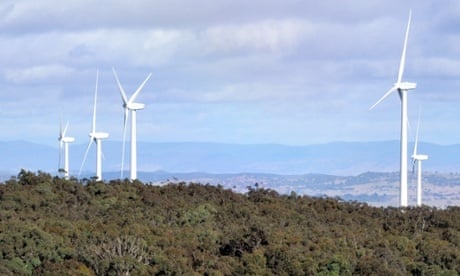
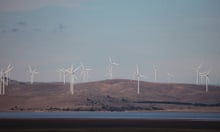
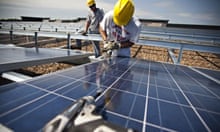

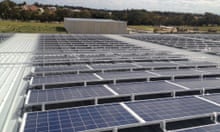
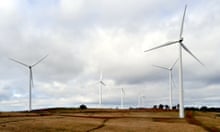
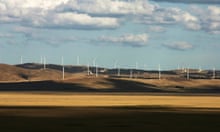

Comments (…)
Sign in or create your Guardian account to join the discussion